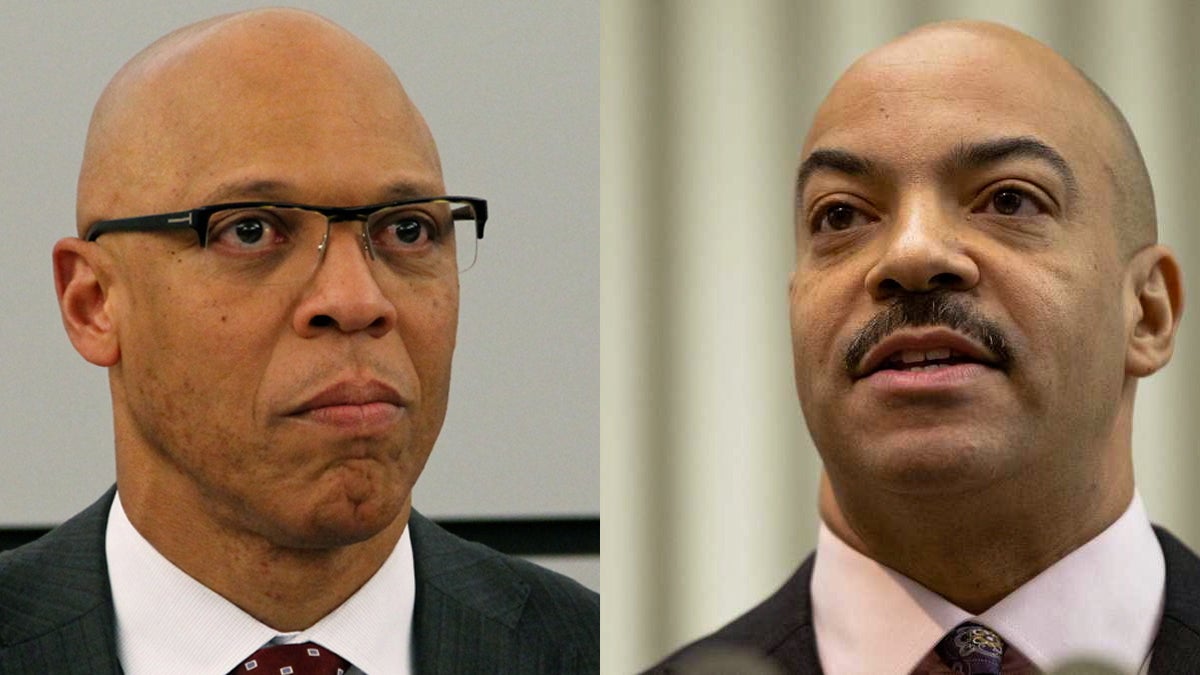Will prosecuting Philly parents cut truancy?
Listen
Superintendent of Schools William Hite (left) and District Attorney Seth Williams take different approaches to Philadelphias truancy problem. (File photos)
For years, the Philadelphia’s District Attorney’s Office has been making the case that the threat of criminal charges will nudge parents to do more to keep their kids from skipping school. In turn, school officials insist they’re doing everything they can and that criminalizing unexcused absences is not a winning strategy.
The debate was recently rehashed at a City Council hearing, probably because one statistic hasn’t changed much: Over the course of a full school year, about 40 percent of Philadelphia public school students are considered truant because they have six or more unexcused absences.
When the weather begins to warm up and the school year winds down, student absences really start picking up.
“I mean, obviously, our great concern is the 40 percent,” said the School District of Philadelphia’s Karyn Lynch in an interview.
She said the district is doing quite a bit to stop kids from playing hooky. If student miss one day, their parents get a robo-call. If missing class becomes a pattern, the city’s Department of Human Services becomes involved.
“And DHS actually goes into the homes, they go into the schools, they talk to the parents, they look at the social issues that exist in the household that are preventing a child from coming to school on an ongoing basis,” Lynch said.
To District Attorney Seth Williams, that strategy isn’t curbing absenteeism enough. And driving the truancy number down, Williams argues, can help cut crime.
If a student missing more than ten days of school without an excuse, the DA’s Office will send a warning letter stating that if the parent doesn’t act, the parents could be facing a charge of endangering the welfare of a child. More than 50 charter schools participate in the program, but no district schools do.
“Although that is not the goal of the program,” Williams said in a statement. “The goal of the program is to make sure students stay in school.”
Michael Churchill, an attorney with the Public Interest Law Center, thinks the threat of charges is a poor incentive.
“Frequently, in fact, it’s not the parents who are the problem. Children are independent about whether they go to school or not,” Churchill said. “And bringing reckless endangerment charges is just a way of increasing the friction inside the family that already exists.”
Another skeptic of the DA’s Office acting as a hammer is Alex Dutton, an attorney with the Education Law Center, a nonprofit advocacy group.
“Many of these students are students with disability, or behavioral health challenges, that need particularized services,” Dutton said.
He said offering those services earlier on, before the issue has become a crisis, could help kids stay in school by tackling what he thinks is the root problem: instability at home.
“There could be several different drivers for a student’s truancy, and it can be different for every single student,” Dutton said. “What really needs to happen is an individualized assessment and linkages to the supports and services in the community to help that student re-engage in school.”
School district officials have often cited federal student privacy protections that they say prevent them from handing over personal student information to prosecutors. Although more than 50 charter schools cooperate with the DA’s Office. And so, it’s possible to find a workaround, prosecutors say.
Not exactly, schools officials counter.
“Here we have an instance where the district attorney is urging the School District of Philadelphia to break the law,” Lynch said.
Putting legal squabbling aide, Lynch said the DA’s program would just add a layer of redundancy and do little to tackle the problem of truancy.
“So essentially what the district attorney is suggesting that we would do is, instead of the school district referring directly to the Department of Human Services, we would refer to the district attorney so that the district attorney can then either send letters of prosecution, and maybe pursue prosecution, or refer those families to DHS, the very same entity we refer to.”
WHYY is your source for fact-based, in-depth journalism and information. As a nonprofit organization, we rely on financial support from readers like you. Please give today.




